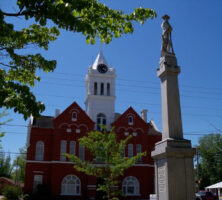Schley County, in west central Georgia, southeast of Columbus, was created in 1857 from portions of Marion and Sumter counties. Schley (pronounced “Sly”) was named for Governor William Schley. Ellaville, Schley’s county seat and the only incorporated town in the county, was named for Ella Burton, the daughter of the man who sold the land for the town’s location.
The pioneer residents of Schley County were small-scale cotton farmers who had come to southwestern Georgia in the 1830s and 1840s from the Georgia coast, Virginia, and the Carolinas. Family farms were largely self-sufficient, and social life centered on court days and Baptist and Methodist church gatherings.
The two county representatives to the Georgia Secession Convention of 1861 cast their votes in favor of leaving the Union. Schley County provided three companies of troops during the Civil War (1861-65). At war’s end the county’s newly freed Black population benefited from the missionary impulse. Mollie Van Layer came from the North to Schley and rented space in town for a school for Black children.

The county’s first newspaper, the Schley County Enterprise, edited by A. J. Harp, was established in the 1880s, and from its pages comes a view of the community during that period. Schley’s commerce reached to neighboring Americus, Buena Vista, and Andersonville. Railroads and wagons carried cotton out of and provisions into the county. By the 1880s the county boasted of schools in Concord, County Line, Ebenezer, Ellaville, Friendship, Glen Holly, La Crosse, Lowe, and Midway.
In the 1890s the Schley County News provided a turn-of-the-century view of the local scene. Within the decade Schley was introduced to electricity, telephones, a bank, a new courthouse, waterworks, and an ice plant.

In 1937 Raymond Duncan established the Ellaville Sun. Duncan’s witticisms and epigrams made the Sun a frequently quoted source for state and even national publications, including the Saturday Evening Post. The Sun, under Duncan’s editorship until his death in 1959, provided its readers with a well-written and conscience-driven view of Schley at mid-century.
According to the 2020 U.S. census, the population of Schley was 4,547.
Agriculture makes up the core of the local economy: farmers raise beef cattle, poultry, peanuts, soybeans, and cotton. Small-scale manufacture, government service, and retail trade are the nonagricultural economic mainstays.
After a twenty-five-year partnership in a tricounty high school with Marion and Webster counties, Schley County opened its own high school in 2000. The new school has done much to regenerate a sense of identity for a county and community facing the twenty-first century.
Schley County holds its annual homecoming weekend, Springtime Ellaville, each April.








